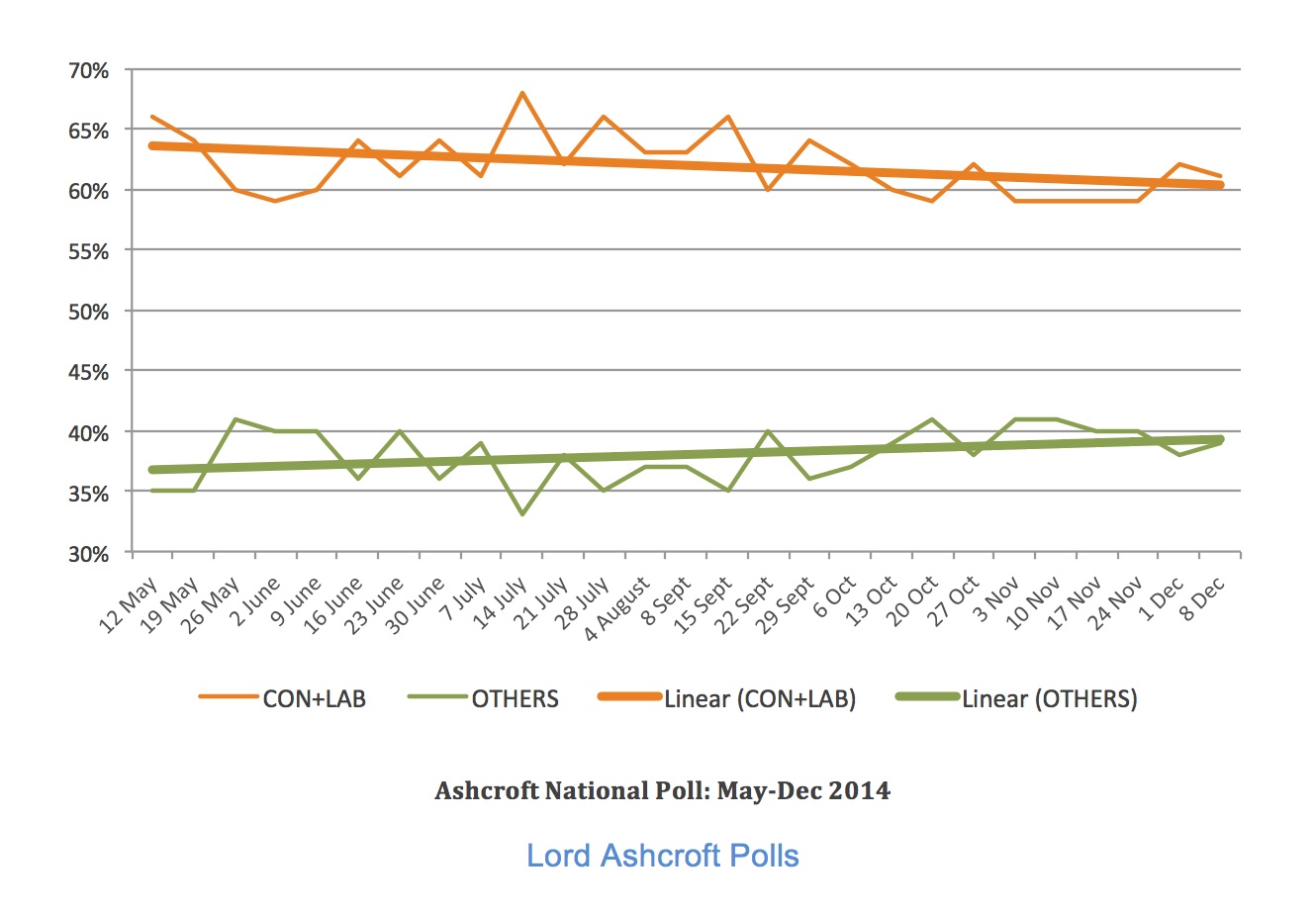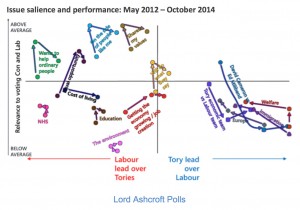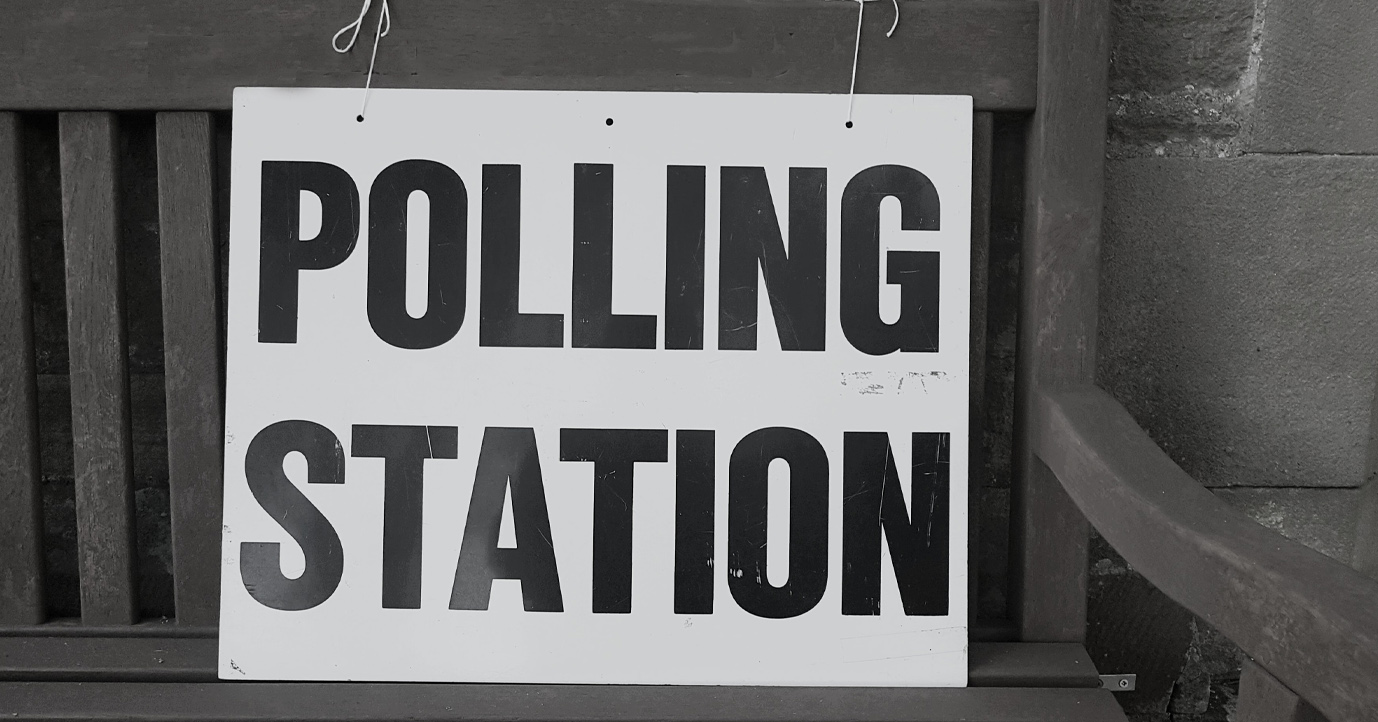
My research in 2014 has included a weekly national telephone poll, surveys in over 100 marginal seats, two rounds of my Project Blueprint research on the quest for a Conservative majority, a detailed study of voters’ attitudes to Europe, polling-day surveys of voters in the European elections, five by-election polls, and regular updates on the state of the parties. Here are some of the things we have learned:
1. The two main parties are on the slide
At the 2010 general election, Labour and the Conservatives between them won 67% of the vote in Great Britain. In six of the last nine weekly editions of the Ashcroft National Poll they have scored a combined total of 60% or below, and on five occasions since mid-October have managed just 59%. The trend over the course of the ANP is slight, but with five months until polling day is unmistakeably away from the two largest parties.
2. With no uniform swing, national polls are not the best guide to seat numbers
Falling support for the two largest parties, combined with the decline of the Liberal Democrats, makes it harder to predict the number of seats each party will have on the basis of their national vote shares. This is doubly the case given the lack of a uniform swing. Taken together, groups of Conservative-Labour marginals in my research have shown swings to Labour at a similar level to those in the national polls, but there are wide variations between seats with similar majorities: in the first round, published in May, I found swings to Labour of 8% in Amber Valley and just 2% in Morecambe & Lunesdale. The variations are even more marked where the Lib Dems are defending seats from the Tories: in September I found a 10% swing from the Lib Dems to the Conservatives in Chippenham and a 7% swing from the Tories to the Lib Dems in Sutton & Cheam. UKIP’s heavily concentrated local campaigning also make uniform swing calculations less useful.
All this makes it harder than usual to predict the outcome. In November I found around a quarter of voters expecting a Labour government, another quarter expecting a Conservative government, one eight expecting a Labour-Lib Dem coalition and another eight expecting a Conservative-Lib Dem coalition. Most of the rest said they didn’t know what to expect. (I think I’m with them.)
3. UKIP are still hurting the Tories most – but Labour are not immune
My research in the marginals has consistently found 2010 Conservative voters more likely than 2010 Labour voters to say they are switching to UKIP (16% compared to 8% in my latest round of Con-Lab marginals, released last week). But UKIP pose a threat to Labour in some seats – in Great Grimsby, Plymouth Moor View and Rother Valley I found UKIP ahead of Labour on the standard voting intention question; only when voters were asked to think about how they would vote in their own constituency did Labour claw back a small lead.
Incidentally, information like this from individual constituency polls has the potential to drive localised tactical voting, as people can see who is in the best position to challenge the incumbent in seats that one party has dominated for decades.
4. Trying to win back UKIP voters will be costly if done wrong
Most voters, including a majority of Conservatives, would be unhappy to see UKIP as part of a coalition government. Indeed Tories would rather see the Lib Dems or the Greens as part of a coalition than Nigel Farage’s party. Tory voters give higher (or rather, less low) ratings to Nick Clegg and the Lib Dems than to Farage and UKIP. My marginals polling has consistently shown around three quarters of Conservatives saying they would definitely not vote UKIP. This illustrates that trying to win back defectors by trying to be more like UKIP would not only fail on its own terms but would risk alienating some existing Tory supporters – not to mention putting off potential joiners from the Lib Dems.
But as I found in my research on Europe, the message “vote UKIP, get Labour” can only have limited success. Most voters either disagreed that a vote for UKIP made a Labour government more likely, or didn’t know whether it was true or not. Some voters may also hear a patronising message to the effect that they are too dim to understand the consequences of their vote – and many live in seats where UKIP present the only prospect of removing a sitting Labour MP.
Ultimately, the biggest motivation of UKIP voters is that the established parties have little to offer and that there is nothing to choose between them. Those who are willing to return will need to feel that it matters who wins in 2015.
5. Talking more about Europe and immigration undermines the Tory advantage on leadership and the economy
The strong preference for David Cameron as Prime Minister, and the greater trust in the Conservatives on managing the economy, are the two biggest advantages the Tories have over Labour. However, even as those leads have grown over the last two years, they have come to matter less in people’s choice between the two main parties. The effect is shown in this chart, which tracks the importance of different issues and the two parties’ relative performance on them.
At the same time, immigration and Europe have grown in salience (partly, no doubt, because the Conservatives spend so much time talking about them) but the Tories’ lead on those issues has dropped (partly, no doubt, because they seem unable to do very much about them). Talking more about them without being able to act can only raise frustration with the main parties, highlighting the appeal of UKIP, and detracting from the Tories’ real strengths.
6. Voters must know the purpose of austerity (and what’s in it for them)
Relatively few voters (16% in October) say they already feel the benefits of an economic recovery. The big divide is between those who expect to at some point (43%) and those who do not (41%). (UKIP voters are the most likely of all to think any recovery will pass them by). There is a similar divide between those who accept the need for continued austerity and spending cuts (45%) and those who think either that no further cuts are needed (35%) or that they were never necessary in the first place (20%). Not surprisingly, those who expect some benefit from the recovery and understand why austerity is not over – who have some idea of what they government is trying to do and how it will help them, both in terms of their own prosperity and the services they use – are more likely to be part of the “coalition of the willing” who will vote Conservative next May or consider doing so.
7. An MP’s incumbency advantage is earned, not bestowed
Studies in recent elections have shown that MPs seeking re-election for the first time tend to do better than their party as a whole. Some now speak of this “first time incumbency” advantage as though it is automatic, and will disproportionately help the Tories, who have the most new MPs. But no such consistent pattern has emerged in my constituency polling. Some MPs are doing better than the national or regional trend (especially Lib Dems) and some are not. No MP can expect a boost simply because he or she has only served one term.
8. There is plenty of room for movement before election day
In the Ashcroft National Poll I regularly find only just of half of people saying they have definitely decided how they will vote. My marginals research shows that Tory defectors to UKIP overwhelmingly prefer Cameron to Miliband and that a Conservative government is their preferred election outcome. Only around half of them rule out returning to their old party before the election, as do only six in ten Lib Dem defectors to Labour. My Rochester & Strood poll found more than one fifth of UKIP voters saying either that they would revert to the Tories in a general election, or that they didn’t know what they would do. Six in ten swing voters, and a third of those who currently say they will vote Labour, worry that Labour have not learned the right lessons from their time in government and that they might spend and borrow more than the country can afford.
In other words, much could change before next May – which is why a poll is (all together now) a snapshot not a prediction.




